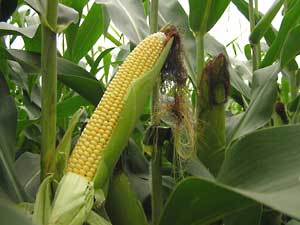
Monday, 5 May 2008
A green
revolution taking place in the fields of Malawi has, in three years,
turned a nation that was once reliant on international aid to feed half
its population into a food exporter.
In doing so, it has set an example for other developing countries
struggling to feed themselves. But it has done it all against the
express wishes of Britain, the United States and the World Bank – its
largest donors.
Malawi suffered a catastrophic drought in 2005.
The World Food Programme estimated that five million people – out of a
population of 12 million – needed food aid and many villages reported
people dying of starvation.
A new government, led by Bingu wa
Mutharika, believed the problem was straightforward. Farmers were using
seeds that were highly susceptible to disease and weevils, and too few
were using fertiliser. If farmers could afford high-yield maize seeds
and fertiliser, the government argued, they would be able to grow
enough food. At a cost of £30m, the government launched a subsidisation
scheme. With a state coupon, the price of a bag of fertiliser fell from
6,500 kwacha (£23) to 900, while a 2kg bag of hybrid maize seed dropped
from 600 kwacha to 30.
Malawi's donors refused to fund the
programme, arguing that subsidising farmers would not bring the desired
results. They were wrong. Malawi needs about 2.2 million tonnes of
maize a year to feed itself and from a low of 1.2 million tonnes in
2005, national maize production rose to 3.2 million tonnes in 2007,
according to the Ministry of Agriculture.
The results are plain
to see in the village of Chiseka, 50 miles south of the capital
Lilongwe, where the village chief Herbert Kamponda remembers the 30
people who perished during the drought. Most died of starvation but a
few were killed in desperate battles with their neighbours over the
last remaining crops. "People were so hungry they would do anything,"
he said.
All that has changed. Tito Jestala, one of the
village's farmers, proudly shows off his maize store, filled to the top
with corn cobs. One acre produced 250kg of maize three years ago – now
it is producing up to 750kg.
The scheme has its critics, who
argue that agricultural subsidies can be ineffective as they provide
the same benefits to rich farmers that could afford the full price, and
that bigger improvements could have been achieved if the money was
invested in agricultural research. Critics also say that Malawi's
agricultural output has been boosted by good rainy seasons rather than
the subsidy scheme.
Idrissa Mwale, the subsidy coordinator at
Malawi's ministry of agriculture, countered that there had been good
rainfall in the past and still bad harvests.
There is also the
problem of corruption. The scheme has become politicised, with MPs
being given large numbers of coupons to hand out to constituents.
Unsurprisingly, that has led to accusations that ruling party
supporters have benefited more than opposition supporters, but the
government said it has tried to make the scheme as transparent as
possible and at least one former MP has been charged with misusing the
coupons.
One potential problem is the rising cost of fertiliser,
caused by soaring oil prices. However, international donors, after
early scepticism, now support the scheme. Britain donated £4m last
year. With many developing countries in the grip of a global food
crisis, Malawi is now urging its neighbours to follow its example.
"We've set the pace," said Mr Mwale. "Sometimes you have to take a bold
step and say 'This is in the interests of our people'."













No comments:
Post a Comment